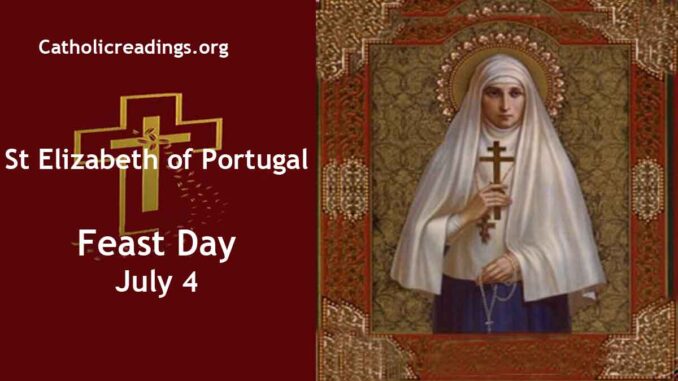St Elizabeth of Portugal is also known as St Elizabeth of Aragon.
She was born on January 4 1271 at Aljafería Palace, Zaragoza, Kingdom of Aragon.
She died on July 4 1336 at the age of 65 years at Estremoz Castle in Estremoz, Alentejo, Kingdom of Portugal.
Her feast day is celebrated on July 4 every year in the Catholic Church.
| St Elizabeth of Portugal Biography | |
|---|---|
 St Elizabeth of Portugal – Feast Day – July 4 2026 | |
| Date of Birth | January 4 1271 |
| Place of Birth | Aljafería Palace, Zaragoza, Kingdom of Aragon |
| Profession | Queen of Portugal |
| Place of Work | Portugal |
| Date of Death | July 4 1336 |
| Place of Death | Estremoz Castle in Estremoz, Alentejo, Kingdom of Portugal |
| Feast Day | July 4 |
| Beatification | By Pope John Paul II on September 25 1988 in Saint Peter’s Square, Vatican City |
| Canonization | By Pope Urban VIII on May 25 1625 |
| Patron Saint of |
|
St Elizabeth of Portugal Life History
St Elizabeth of Hungary’s father was Infante Peter (King Peter III) and her mother was Constance of Sicily. St Elizabeth of Hungary became the sister of three kings namely James II of Aragon, Alfonso II and Frederick III of Sicily.
Her husband, King Denis of Portugal, was very abusive, a war-monger and always was suspicious of her generosity to poor people.
Elizabeth showed a great zeal for the Christian faith from an early age. She used to fast and say the full Divine Office daily.
At 17 years old, she married and wedded King Denis of Portugal in 1288, when Denis was 26 years old. They were blessed with two children; a son who became King Afonso IV of Portugal and a daughter called Constance, who married King Ferdinand IV of Castile.
Elizabeth was a very pious lady and devouted most of her time and resources to the poor and the sick. She used to be ridiculed and frowned upon by people for this, especially her husband. She eventually succeeded to convert her abusive and adulterous husband through prayer.
St Elizabeth was very instrumental in the reconciliation between James II of Aragon, her brother and Fernando IV of Castile.
In 1297, she also mediated in the negotiations of the Treaty of Alcanices, which fixed the borders between the Kingdoms of King Denis of Portugal and King Fernando IV of Castile.
In 1323, St Elizabeth prevented a civil war between her husband and Prince Afonso, her son. Prince Afonso despised his father, King Denis and accused him of favoring Afonso Sanches, the king’s illegitimate son. A confrontation ensued on the field of Alvalade where King Denis wanted to kill Prince Afonso.
St Elizabeth mounted on a mule and positioned herself between the armies of the two adversaries in order to prevent combat.
Consequently, peace returned when the king’s illegitimate son was exiled, and Prince Afonso pledged allegiance to the king.
When King Denis died in 1325, St Elizabeth joined the Third Order of St. Francis and retired to the monastery of the Poor Clare nuns which she had founded in 1314 in Coimbra.
In the modern day, it is known as the Monastery of Santa Clara-a-Velha. She devoted herself to the poor and sick for the rest of her life. She fed the starving, provided shelter for pilgrims, and educated the poor children.
She supported various hospitals in Coimbra, Santarém and Leiria and various religious projects like the Trinity Convent in Lisbon, Leiria Chapel, Óbidos Chapel and the cloister in Alcobaça.
In 1336, his son, King Afonso IV marshaled his troops to fight King Alfonso XI of Castile who was mistreating his daughter Maria.
Maria was married to King Alfonso XI. St Elizabeth was called to mediate the conflict once more as a peacemaker.
It is during this rigorous madiation and peacemaking that the aging Elizabeth fell ill with a fever and died on July 4 1336 in Estremoz Castle in Estremoz, Alentejo, Kingdom of Portugal.
St Elizabeth Birth
St Elizabeth was born on January 4 1271 at Aljafería Palace, Zaragoza, Kingdom of Aragon
St Elizabeth Death
She died of fever on July 4 1336 in Estremoz Castle in Estremoz, Alentejo, Kingdom of Portugal.
Relics
St Elizabeth was buried in the Convent of Santa Clara in Coimbra. Due to flooding by the Mondego River in the 17th century, her remains were moved to the Monastery of Santa Clara-a-Nova.
St Elizabeth Feast Day
The feast day is celebrated on July 4 every year in the Catholic Church as an optional memorial. In the United States, it is transferred to July 5 because July 4 is Independence Day.
St Elizabeth is the Patron Saint of
- Co-patron of the Diocese of San Cristóbal de La Laguna (Canary Islands, Spain)
- Widows
- Victims of adultery, jealousy and unfaithfulness
- Tertiaries
- Queens
- Peace
- Invoked in time of war
- Falsely accused people
- Difficult marriages
- Coimbra, Portugal
- Charitable societies and workers
- Brides
- Against jealousy
Representation
St Elizabeth is usually represented in art as
- Woman crowned with roses
- Woman carrying roses in her lap in winter
- Franciscan tertiary nun
- Franciscan nun with a jug in her hand
- Franciscan nun with a beggar nearby
- Franciscan nun rose in her hand
Related Links
Powered By SEO Experts
Follow @ReadingCatholic
